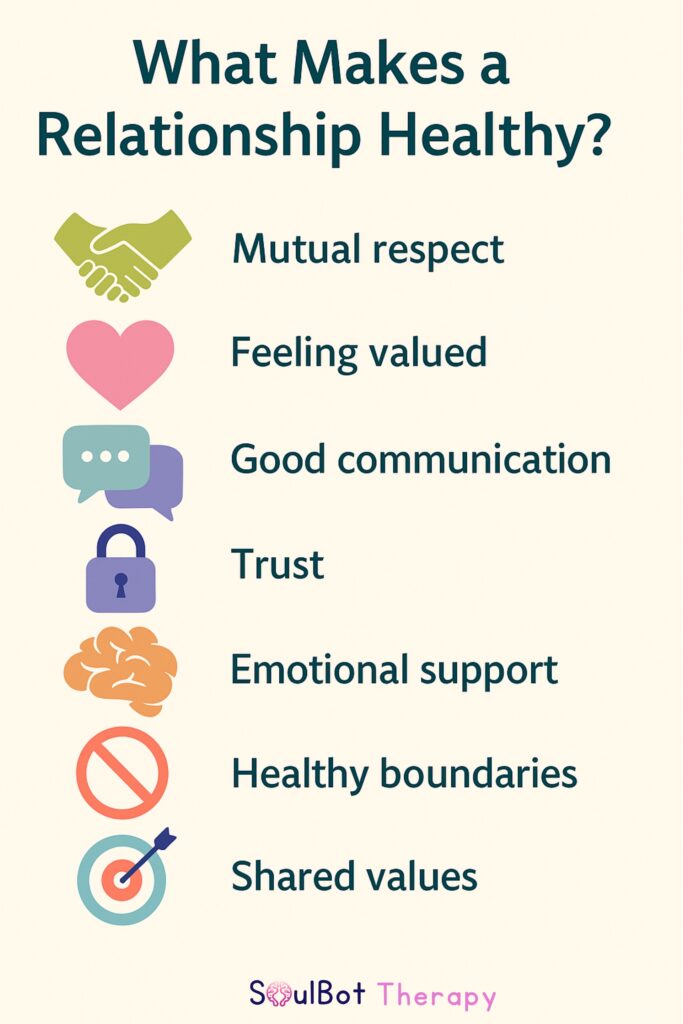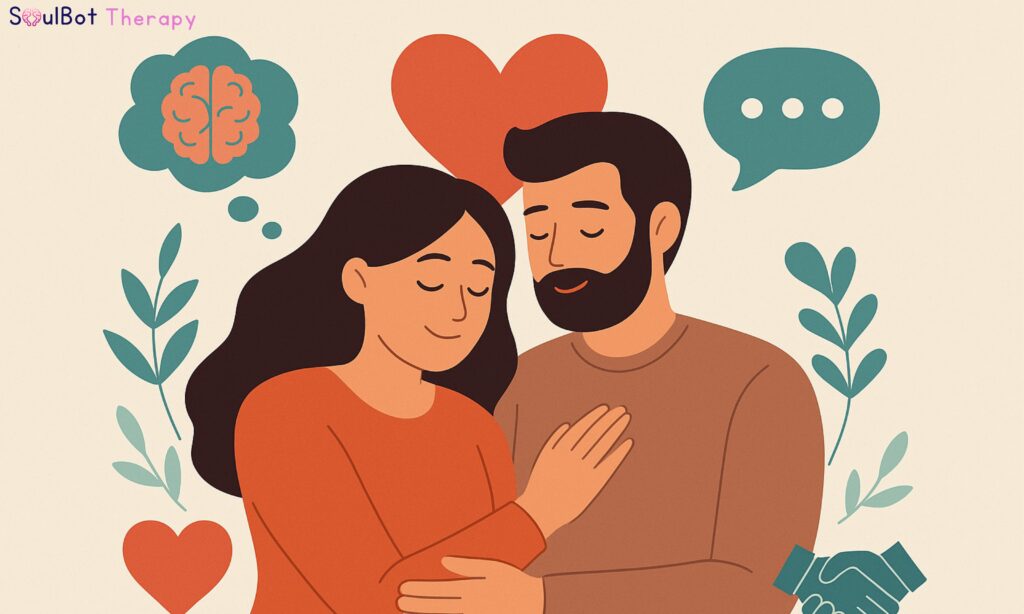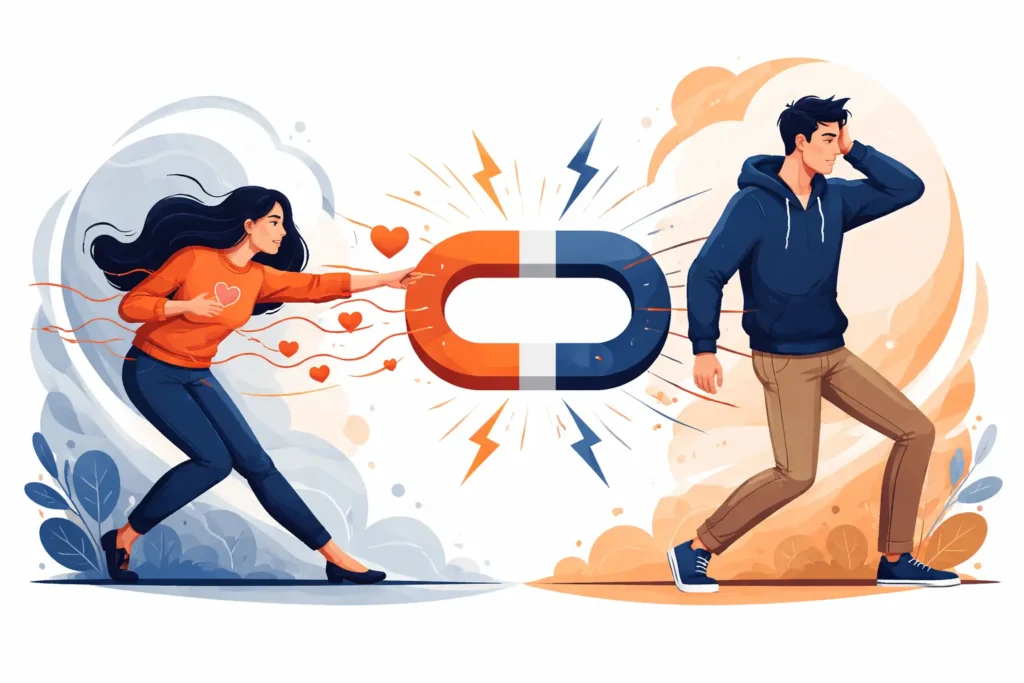What makes love last and feel good while it lasts?
Most of us were never taught how the psychology of healthy relationships works. We learned from movies. From families with secrets. From friends who were just as confused as we were.
But real relationships — the kind that feel safe, steady, and still exciting — don’t just “click.”
They’re built on psychology-backed traits that anyone can develop. Let’s explore the psychology of healthy relationships — and how to know if you’re in one, building one, or ready for one.
What Is a Healthy Relationship According to Psychology?
In psychology, a healthy relationship is one built on emotional safety, mutual respect, and secure attachment.
It’s not about never fighting. It’s about how you fight, how you repair, and how emotionally safe both people feel — even in the messiness.
Key features of psychologically healthy love:
- Safe to speak and be heard
- Room for boundaries and individuality
- Consistency without control
- Vulnerability met with compassion, not shutdown
A healthy relationship isn’t perfect — it’s emotionally intelligent.
What Makes a Relationship Healthy? (7 Core Traits)
According to modern relationship psychology (including the Gottman Institute), here are 7 signs you’re in a psychologically secure relationship:
1. Emotional Safety Is Prioritised
You feel safe expressing fear, desire, and needs — without being mocked, gaslit, or ignored.
2. There’s Consistent Communication, Not Constant Contact
You can be apart without spiralling. You talk through things instead of building walls.
3. Repair Happens After Conflict
It’s not about avoiding arguments — it’s about reconnecting after them.
4. Boundaries Are Honoured, Not Resisted
Both people respect time, energy, and individuality, without taking it personally.
5. There’s Curiosity, Not Control
You ask questions instead of assuming. You stay open rather than trying to “fix” the other person.
6. Affection Is Given Freely
Love isn’t used as a reward or withheld as punishment. It flows in your way, your rhythm.
7. Growth Is Encouraged, Not Feared
When one of you grows, the relationship expands instead of getting threatened.
“A healthy relationship doesn’t demand perfection. It invites vulnerability, safety, and growth.”

How Attachment Style Impacts Healthy Relationships?
Understanding your attachment style can explain why even good relationships can feel confusing.
- Secure Attachment: Trusts, communicates, and seeks connection without fear of abandonment.
- Anxious Attachment: Craves closeness but fears rejection — often needs reassurance.
- Avoidant Attachment: Values independence — sometimes at the cost of intimacy.
- Disorganised Attachment: Push-pull dynamic, often from trauma or unstable environments.
The psychology of healthy relationships teaches that attachment wounds can heal.
You can become secure with effort, awareness, and safe relationships.
Why Emotional Safety in Relationships Is Non-Negotiable?
It’s easy to overlook. But emotional safety is the foundation of healthy love habits.
If you:
- Feel scared to express something
- Walk on eggshells after disagreements
- Apologise before speaking your truth
- Constantly monitor how “needy” you’re being…
You’re not in a safe space, and your nervous system knows it.
In healthy relationships, you don’t have to earn your safety. It’s built into the bond.
Habits That Build (or Break) Healthy Relationships
🧠 Build With:
- Active listening (not interrupting, really hearing)
- Appreciation instead of criticism
- Daily check-ins, even if brief
- Owning your emotional triggers
- Asking before assuming
❌ Break With:
- Silent treatment or emotional stonewalling
- Scorekeeping (“I did X, you owe me Y”)
- Dismissing emotions as “overreacting”
- Using love as leverage
- Avoiding repair after conflict
These micro-habits become emotional patterns. Patterns either create safety or slowly erode it.
How to Know If Your Relationship Is Healthy?
It’s not about how it looks to others. It’s about how it feels to you:
- You feel seen and safe, even in hard moments
- You don’t constantly overthink where you stand
- You don’t feel like you’re “too much”
- You’re not afraid to disagree
- You both take responsibility, not just one person doing all the work
Ask yourself:
“Do I feel more like myself in this relationship — or less?”
That’s your sign.
Can You Rewire an Unhealthy Relationship Dynamic?
Yes — but only if:
- Both people are aware of the pattern
- Both are willing to change their role in it
- There’s honest communication and safe conflict resolution
You can’t build a healthy connection with someone who won’t acknowledge the cracks. But with effort, support, and the right mindset, healing is possible.
Not sure where your relationship stands? Or if it’s emotionally safe?
You don’t need to figure it out alone.
👉 Book a Free Consultation — our therapists help you unpack patterns and build a love that lasts.
You Deserve a Relationship That Feels Like Safety, Not Survival
If this blog made you reflect, question, or breathe a little deeper, trust that.
The psychology of healthy relationships isn’t just theory. It’s your roadmap to love that doesn’t break you down — it builds you up. Love shouldn’t feel like guessing games, walking on eggshells, or slowly shrinking to fit.
👉 Book a Free Consultation and start building relationships that are secure, expansive, and real.
🔗 Related SoulBot Reads
| How Low Self-Esteem Affects Relationships |
| Self-Doubt or Intuition in Relationships |
| What Does a Secure Partner Look Like? |








